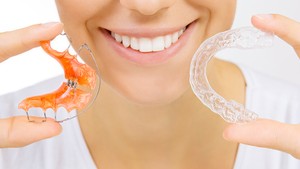If you’ve recently started using a retainer, you may be curious about the best ways to keep it clean.






Save $250 off braces or Invisalign!*
Schedule your appointment online.
If you’ve recently started using a retainer, you may be curious about the best ways to keep it clean. One common question is, “Can I soak my retainer in mouthwash?” While mouthwash is great for freshening breath, not all cleaning methods are suitable for retainers. Proper retainer care is essential to ensure your appliance remains in good condition and functions effectively. This article explores the best practices for retainer maintenance, including the risks of using mouthwash and alternative cleaning methods. Read on to learn how to keep your retainer fresh and safe for daily use.
Understanding Retainer Care
Maintaining oral hygiene while using retainers is crucial for overall dental health. Retainers can trap food particles and bacteria, leading to plaque buildup and bad breath if not cleaned properly. Knowing how to sanitize your retainer is essential to keep your mouth healthy and to ensure that your retainer remains in good condition.
There are several common types of retainers, including fixed and removable options made from materials like plastic, acrylic, or metal. Each type has its own care requirements. For instance, removable retainers, often made of clear plastic, are more susceptible to staining and odor if not cared for properly. Understanding the material of your retainer can help you choose the right cleaning methods.
Neglecting retainer care can have serious consequences for your dental health. A dirty retainer can contribute to gum disease, tooth decay, and other oral health issues. Additionally, if your retainer becomes damaged or discolored due to improper care, it may not fit correctly, potentially affecting the alignment of your teeth. Therefore, it’s important to establish a consistent cleaning routine to keep your retainer—and your smile—in top shape.
The Risks of Soaking Retainers in Mouthwash
Soaking your retainers in mouthwash may seem like a convenient way to freshen it up, but there are several risks associated with this practice that you should consider. Many retainers are made from thermoplastic materials that can be sensitive to certain chemicals found in mouthwash. Prolonged exposure to these substances can lead to warping or discoloration, potentially compromising the fit and effectiveness of your retainer.
Furthermore, mouthwash often contains ingredients such as alcohol, which can dry out and weaken the material of your retainer over time. This degradation can result in cracks or other damage that may necessitate a costly replacement. Additionally, some mouthwashes contain dyes that can stain your retainer, affecting its appearance and hygiene.
Fortunately, there are safer alternatives for cleaning your retainer without the risks associated with mouthwash. A gentle solution of warm water and mild soap is often sufficient for daily cleaning. You can also use specialized retainer cleaners or tablets designed to disinfect and remove bacteria without harming the retainer material. Regularly rinsing your retainer with plain water after meals can also help maintain its cleanliness and longevity. Choosing the right cleaning method ensures that your retainer remains in optimal condition, ultimately supporting your orthodontic treatment.
How to Properly Clean Your Retainer
Keeping your retainer clean is essential for maintaining oral health and ensuring the longevity of the device. While it might be tempting to soak your retainer in mouthwash, it’s important to understand that not all cleaning solutions are safe for dental appliances. Instead, consider using mild dish soap, clear antibacterial soap, or specialized retainer cleaning tablets. These options effectively eliminate bacteria and sanitize your retainers without damaging the retainer material.
To properly clean your retainer, follow this step-by-step process. First, rinse your retainer under lukewarm water to remove any food particles. Next, apply a small amount of your chosen cleaning solution onto a soft-bristled toothbrush and gently brush the retainer, ensuring you reach all surfaces, including the crevices. Rinse thoroughly with lukewarm water to remove any soap residue. Finally, let your retainer air dry on a clean surface before placing it back in your mouth or its case.
Frequency of cleaning is key to preventing plaque buildup and odor. Ideally, you should clean your retainer daily, especially if you wear it overnight. Additionally, give your retainer a deep clean at least once a week using a specialized cleaner to ensure it remains in excellent condition. Always remember to store your retainer in a protective case when not in use to prevent damage and contamination.
Natural Cleaning Methods for Retainers
Maintaining the cleanliness of your retainer is essential for oral health, and natural cleaning methods can be both effective and safe. One popular combination for cleaning retainers is baking soda and vinegar. These two household items work together to eliminate bacteria, remove stains, and neutralize odors, making them an excellent alternative to harsh chemicals.
Using natural cleaning solutions has several benefits. Firstly, they are less likely to cause irritation to your gums and teeth compared to commercial products containing strong chemicals. Secondly, baking soda has gentle abrasive properties that can help scrub away plaque without damaging the retainer material. Vinegar, on the other hand, acts as a natural disinfectant, ensuring that your retainer is not only clean but also hygienic.
To prepare this natural cleaning solution, start by mixing two tablespoons of baking soda with one cup of white vinegar in a bowl. You’ll notice a fizzy reaction as the two ingredients combine. Once the fizzing subsides, immerse your retainer in the solution and let it soak for about 15-20 minutes. After soaking, gently brush your retainer with a soft toothbrush to remove any remaining debris, then rinse it thoroughly under lukewarm water. This simple yet effective method can keep your retainer looking new and fresh, ensuring that you maintain optimal oral hygiene.
Do’s and Don’ts of Retainer Maintenance
Maintaining your retainer is crucial for ensuring it stays clean and functional. Here are some essential do’s for effective retainer care:
Do’s: Always rinse your retainer with cool water after use to remove any saliva and debris. Regularly brush your retainer with a soft toothbrush and mild soap or a retainer cleaner, avoiding toothpaste as it can be abrasive. It’s also wise to store your retainer in a protective case when not in use, preventing damage or contamination.
Common mistakes to avoid: One of the biggest errors is soaking your retainer in mouthwash. While it may seem like a quick fix, many mouthwashes contain alcohol or harsh chemicals that can degrade the material of your retainer. Additionally, never use hot water, as it can warp the retainer. Avoid using bleach or any harsh cleaning agents that could cause harm.
When to seek professional advice: If you notice any changes in the fit of your retainer, such as discomfort or looseness, it’s essential to consult your orthodontist. They can assess any issues and provide guidance on proper maintenance. If your retainer develops a persistent odor or stain that regular cleaning cannot resolve, professional cleaning may be necessary. Remember, taking care of your retainer not only preserves its condition but also contributes to your overall oral health.
Final Thoughts on Retainer Care
Maintaining your retainer is essential for ensuring its longevity and effectiveness. Best practices for retainer maintenance include cleaning it daily with a gentle toothbrush and non-abrasive toothpaste. Soaking your retainer in a solution specifically designed for orthodontic appliances is highly recommended, as this helps eliminate bacteria and odors. While some may wonder, “Can I soak my retainer in mouthwash?” it is best to use products specifically formulated for retainers to avoid any damage or discoloration.
Prioritizing your oral hygiene is crucial, not just for your retainer but also for your overall dental health. Regular brushing and flossing, combined with the proper care of your retainer, will help prevent plaque buildup and ensure that your smile stays bright and healthy. Remember, a clean retainer contributes to fresh breath and minimizes the risk of any oral infections.
For those looking to delve deeper into retainer care, numerous resources are available. Websites like the American Association of Orthodontists provide valuable information on retainer maintenance, while your orthodontist can offer personalized guidance tailored to your specific needs. By taking the time to learn more about proper retainer care, you can ensure that your orthodontic treatment stays on track and your smile remains beautiful for years to come.








